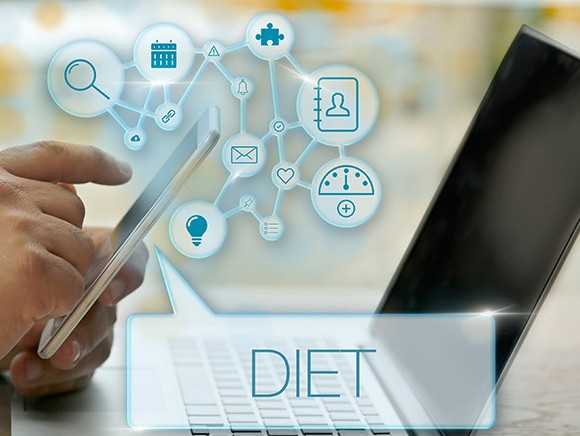
Besides sustainability, health is one of the most important issues in the food sector. “In the future, we will see a society in which each individual can and wants to make conscious choices to follow a diet that is precisely aligned with his or her needs,” says Nard Clabbers from TNO.
This prediction is echoed in Rabobank’s ‘Theme Update’ on healthy food and personalised nutrition (Gezonde Voeding - Hard op weg naar eten op maat) from December 2016: “Healthy food is a source of unbelievable opportunities for the food industry in the years ahead...Almost half of all Dutch people indicate that they are prepared to pay more for food that demonstrably makes or keeps them healthier. The industry can only profit from that when the added value of personalised food becomes clear for consumers and society alike. The regular food industry will have to stay on its toes if it doesn’t want to miss the boat.”
Nard Clabbers, Senior Business Developer Personalised Nutrition and Health at TNO, talks about ‘empowering the consumer’. “I foresee a declining market for products that are less good for you and that are not produced sustainably. People’s food choices will continue to be based on price and flavour, but factors such as environmental impact and health will play an ever-greater role. Consumers have the power to decide and are less gullible. They rarely believe manufacturers’ and supermarkets’ claims. In contrast, however, the information shared within peer groups and on social media does carry weight.”
The Personalised Nutrition and Health Consortium – an initiative of TNO and Wageningen University & Research – has been set up to respond the these needs. We first reported on the ambitious plans for the partnership a year ago, and the consortium became a reality last summer. Plenty of work is already underway to investigate the added value of personalised food and to find out which technology and knowledge is needed to facilitate personalised nutrition and health advice on a large scale. Partners throughout the entire chain, from farmers and food manufacturers to caterers and retailers, can add value to their product or service and hence contribute to a healthier society. Various scientific disciplines are collaborating within the international consortium, from life sciences and behavioural sciences to data analysis and sensor technology. “Based on the insights from the research, the consortium partners (see box, Ed.) can develop tailor-made recommendations and shopping lists, for example, or apps which enable people to keep a close eye on their health. It’s not just a case of ‘to measure is to know’; we’re also conducting research into how people can be triggered to actually change their behaviour.”
Flavour experiences influenced by genetics
Coriander is a very divisive herb: some people like the taste of it, while others say it has a soapy flavour. The way people experience the flavour of coriander (also called ‘cilantro’ in the USA) is probably genetically determined, according to a study of 14,000 test subjects. After examining the total genome of all the test subjects, the researchers discovered an association with the OR6A2 gene on the 11th chromosome. That gene enables us to smell certain chemicals, including E-(2)-Decenal which is found in both coriander and the pungent substances that insects secrete as a defence mechanism.
Source: NutritionFacts
“Personalised food takes account of and is aligned with factors like age, gender, weight, susceptibility to diseases, lifestyle, allergies and all kinds of other personal traits and preferences. This is no longer something from science fiction. Sensors enabling ‘do-it-yourself ‘ measurements are becoming better and cheaper all the time. There are activity trackers that can be worn as watches and fitness apps for smartphones. Thanks to the Human Genome Project (HGP), the human genome has been completely sequenced since July 2000. Pharmaceutical and biotech companies in particular are now targeting much of their research efforts on genome interpretation. I believe that it will be possible for everyone to know their own genetic code in the future,” says Nard.
“The large amount of information that the measurements generate can already be used to substantiate the health effects of products or in research into food, health and behaviour,” continues Nard. “And if sharing that information results in personalised dietary advice that takes your metabolism into account and ensures you age more healthily, then I expect there to be a lot of interest in that. The advice must have demonstrable added value and it must be safe, otherwise people will not be prepared to share their information. That’s why, within our research programme, we pay specific attention to topics such as consumer confidence in the (dietary) advice, freedom of choice and safeguarding the privacy of consumer data. The programme is open for new partners, whether multinationals or SMEs. They can participate in the whole programme or just parts of it,” states Nard Clabbers.
Interested in becoming a partner?
The Personalised Nutrition and Health Consortium is a long-term public-private partnership within the Dutch Top Sectors of Agri&Food and Lifesciences & Health. It is aligned with other more fundamental projects in this area that are financed by the likes of Top Institute Food and Nutrition (TIFN) and Netherlands Organisation for Scientific Research (NWO). The research programme comprises sub-projects, each lasting two to three years. The current consortium partners are: Philips, Google Food, Menzis, Albert Heijn, Jumbo, FrieslandCampina, Dutch Spices, PS in foodservice, Noldus Information Technology, SmartWithFood, VitalinQ Lifestyle Support, Sense Health, NIPED and Vital 10.
Source: Foto laptop: ©Shutterstock/Marta Design